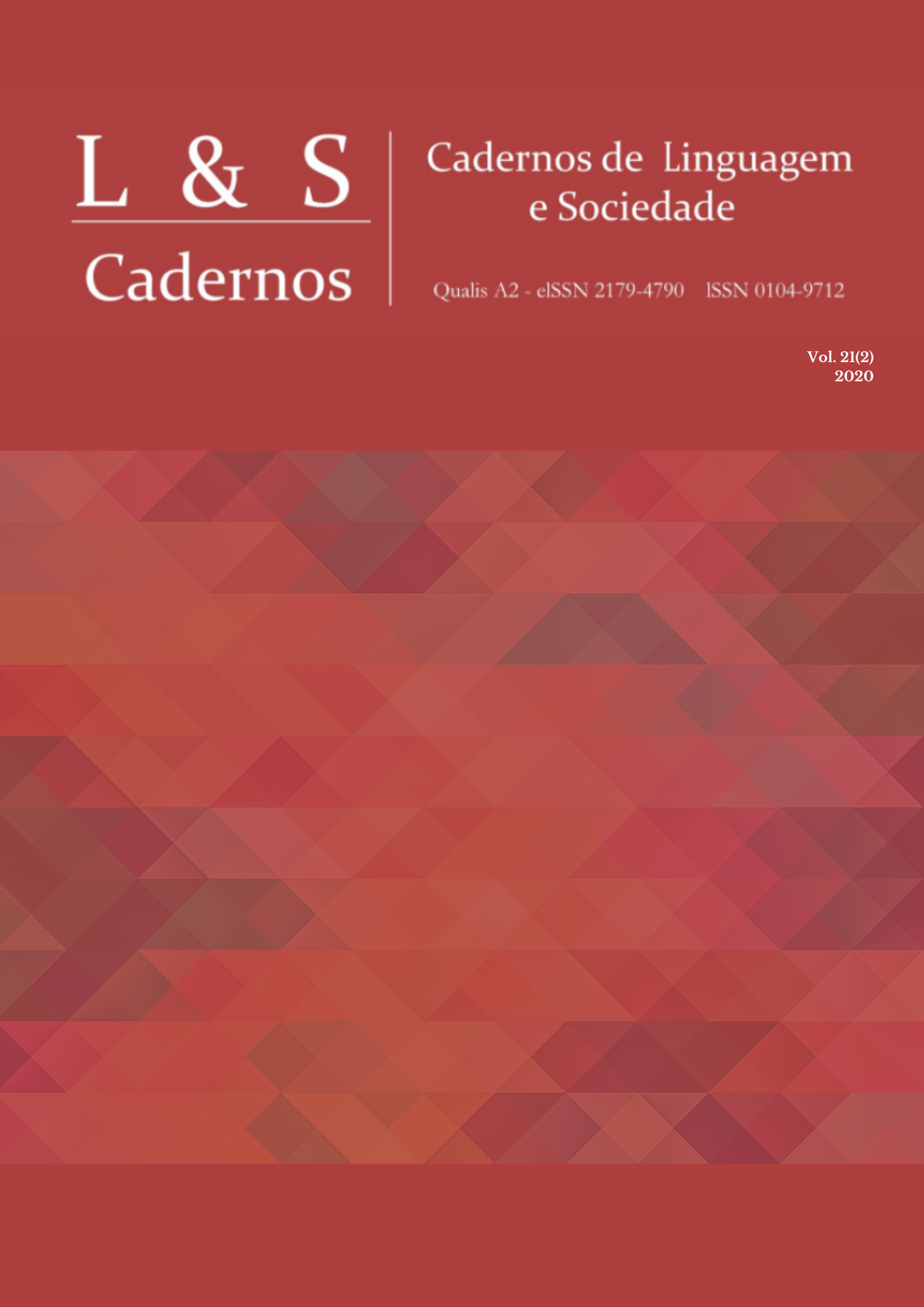Modos Queer de pesquisar e a questão racial: conjugando epistemologias feministas, interseccionalidade e decolonialidade
DOI:
https://doi.org/10.26512/les.v21i2.35198Palavras-chave:
queer, interseccionalidade, decolonialidade, epistemologias feministas, branquitudeResumo
O objetivo deste ensaio é pensar a produção de conhecimento engajada com princípios de justiça social, ao se ocupar de fenômenos sociais em que a linguagem enquanto sociossemiose tem um papel fundamental. Nesse contexto, procuro refletir sobre o fazer acadêmico queer em um paradigma interseccional e decolonial, necessariamente contra-hegemônico, feminista e antirracista, que centraliza a formulação de entendimentos acerca da relação micro/macro, em processos que fomentem o sentir crítico na pesquisa como locus de reflexividade crítica, no contexto da academia como espaço institucional da branquitude.
Downloads
Referências
ALMEIDA, S. Racismo Estrutural. Belo Horizonte: Letramento: Justificando, 2018.
ANZALDÚA, G. Making Face / Making Soul Haciendo Caras. Creative and Critical Perspectives by Women of Color. San Francisco: Aunt Lute, 1987.
ALCOFF, L. The problem of speaking for others. Cultural Critique. no. 20 (Winter, 1991-1992), 2007.
ALCOFF, L. Mignolo’s Epistemology of Coloniality. The New Centennial Review, v. 7, n. 3, 2008.
ALCOFF, L.; POTTER, E. Feminist Epistemologies. New York / London: Routledge, 1993.
BAIRROS, L. Nossos feminismos revisitados. Revista Estudos Feministas, v. 3, n. 2, p. 458-463, 1995.
BENTO, M. A. S. Branqueamento e Branquitude no Brasil. In: CARONE, I.; BENTO, M. A. S. (org.). Psicologia social do racismo: estudos sobre branquitude e branqueamento no Brasil. Petrópolis, RJ: Vozes, 2002.
BORGES, T. R. S. Por um sentir crítico: um olhar feminista interseccional sobre a socioconstrução de identidades sociais de gênero, raça/etnia e classe de professoras de línguas (master’s thesis). Pontifical Catholic University of Rio de Janeiro, Rio de Janeiro, Brazil, 2017a.
BORGES, T. R. S. Pelo amadurecimento de um ‘sentir crítico’: entendendo a socioconstrução de identidade de uma professora negra e seus atravessamentos interseccionais. Veredas, v. 21, n. 2, p. 8-23, 2017b.
BLOMMAERT, J. Context is / as critique. Critique of Anthropology, v. 21, n. 1, p. 13”“32, 2008.
BLOMMAERT, J. Language and Superdiversity. Diversities, v. 13, n. 2, 2011.
BORBA, R. A linguagem importa? Sobre performance, performatividade e peregrinações conceituais. Cadernos Pagu, Campinas, n. 43, p. 4441-474, jul./dez. 2014.
BROWN, W. Undoing the demos. MIT Press, 2015.
BUTLER, J. Performative Acts and Gender Constitution: An Essay in Phenomenology and Feminist Theory Theatre Journal, v. 40, n. 4, p. 519-531, Dec. 1988;
BUTLER, J. Gender trouble: feminism and the subversion of identity. New York: Routledge, 1990.
BUTLER, J. Bodies that matter: on the discursive limits of 'sex'. New York: Routledge, 1993.
BUTLER, J. Excitable Speech: A politics of the performative. New York: Routledge, 1997.
BUTLER, J. Undoing Gender. New York/London: Routledge, 2004.
BUTLER, J. When gesture becomes event. Theater Performance Philosophy ”“ International Conference: Crossings and Transfers in Contemporary Anglo-American Thought. TPP2014 : Judith Butler. Disponível em: https://goo.gl/UUjwK0
CARONE, I.; BENTO, M. A. S. Psicologia Social do Racismo: Estudos sobre a branquitude e branqueamento no Brasil. Petrópolis, RJ: Editora Vozes, 2014.
CARNEIRO, S. A Construção do Outro como não-ser como fundamento do ser. Tese de Doutorado em Educação. Área da Filosofia da Educação. Universidade de São Paulo, SP, 2005.
CÉSAIRE, A. Discurso sobre o colonialismo. Lisboa: Sá da Costa, 1978.
COLLINS, P. H. Black feminist thought: knowledge, consciousness, and the politics of empowerment. New York: Routledge, 1990.
COLLINS, P. H. On Intellectual Activism. Philadelphia: Temple University Press, 2013.
COLLINS, P. H. Se perdeu na tradução? Feminismo negro, interseccionalidade e política emancipatória. Revista Parágrafo, p.6-17, 2017.
COLLINS, P.; BILGE, S. Intersectionality. Cambridge: Polity Press, 2016.
CRENSHAW, K. Demarginalizing the Intersection of Race and Sex: A Black Feminist Critique of Antidiscrimination Doctrine, Feminist Theory and Antiracist Politics. The University of Chicago Legal Forum 140, p. 139-167, 1989.
CRENSHAW, K. Mapping the Margins: Intersectionality, Identity Politics, and Violence against Women of Color. Stanford Law Review, v. 43, n. 6, p.1241-1299, 1991.
CRENSHAW, K. The urgency of intersectionality. TED Talk, 2016. Disponível: http://tiny.cc/r1zqhz
CURIEL, O. Feminismo Decolonial. Prácticas Políticas Transformadoras. Conferência, 2017. Disponível: http://tiny.cc/f2zqhz
DAVIS, A. Y. Women, race and class. New York: Vintage books, 1983.
DAVIS, A. Y. Freedom is a constant struggle.Chicago: Haymarket books, 2016.
FABRICIO, B. Linguística Aplicada como espaço de “desaprendizagem”: redescrições em curso. In: MOITA LOPES, L. P. Por uma Linguística Aplicada Indisciplinar. São Paulo: Parábola Editorial, 2006. p.45-63.
FABRICIO, B. Transcontextos educacionais: gêneros e sexualidades em trajetórias de socialização na escola. In: SILVA, D. N.; FERREIRA, D. M. M.; ALENCAR, C. N. (org.) Nova Pragmática: Modos de Fazer. São Paulo: Cortez Editora, 2014. p.145-189.
FERREIRA, A. J. Letramento racial crítico através de narrativas autobiográficas: com atividades reflexivas. Ponta Grossa: Editora Estúdio Texto, 2015.
FREIRE, P. Pedagogia da Tolerância. Rio de Janeiro/ São Paulo: Paz e Terra, 1995.
FOUCAULT, M. A ordem do discurso. São Paulo: Edições Loyola, 2014.
FOUCAULT, M. História da sexualidade: a vontade de saber. Rio de Janeiro: Paz e Terra, 2014.
FOUCAULT, M. Microfísica do Poder. Rio de Janeiro: Graal, 1979.
GAL, S. Language, gender and power: an anthropological review. In: Hall e Bucholtz (ed.). Gender articulated: socially constructed self. New York: Routledge, 1995. p.169-182.
GONZALEZ, L. Racismo e sexismo na cultura brasileira. Revista Ciências Sociais Hoje, Anpocs, p. 223-244, 1984.
HALLIDAY, M. A. K. An Introduction to Functional Grammar. Londres: Routledge, 1994.
HARAWAY, D. Situated Knowledges: The Science Question in Feminism and the Privilege of Partial Perspective. Feminist Studies, v. 14, n. 3, p. 575-599, Autumn 1988.
HARDING S. Rethinking Standpoint Epistemology: What Is“Strong Objectivity”?. In: ALCOFF, L; POTTER, E. Feminist Epistemologies. New York / London: Routledge, 1993.
hooks, b. Ain’t I a woman? London: Pluto Press, 1982.
HARDING S. Feminist Theory from margin to center. Boston: South End Press, 1984.
HARDING S. Teaching community. NY/London: Routledge, 2003.
HARDING S. All about love. NY/London: Routledge, 2010.
KILOMBA, G. “Who can speak?” Facebook Official Page, 2013. Disponível em: https://goo.gl/btTfQ9
KILOMBA, G. O racismo é uma problemática branca. Carta Capital, 2016. Disponível em: http://tiny.cc/uf0qhz
LIMA, F. Sobre dores, saudades e (re)existências. Dossiê: Raça, Interseccionalidade e Violência ”“ Corpos e processos de subjetivação em mulheres negras e lésbicas. v.04, n.02, 2018.
LORDE, A. Sister Outsider: Essays and Speeches. New York: The Crossing Press, 1984.
LYKKE, N. Feminist studies: a guide to intersectional theory, methodology and writing. Nova Iorque/ Londres: Routledge, 2010.
MBEMBE, A. A crítica da razão negra. São Paulo: N-1 edições, 2018a.
MBEMBE, A. Necropolítica. São Paulo: N-1 edições, 2018b.
MENEZES DE SOUZA, L. M. T. Para uma redefinição de letramento crítico: conflito e produção de significação. In: Maciel, R. F.; Araújo, V. A. (org.) Formação de professores de Línguas: ampliando perspectivas. Jundiaí: Paco Ed. 2011. p. 128-140.
MOITA LOPES, L. P. Por uma Linguística Aplicada Indisciplinar. São Paulo: Parábola, 2006.
MOITA LOPES, L. P. Linguística Aplicada na Modernidade recente. São Paulo: Parábola Editorial, 2013.
MOHANTY, C. T. Under Western Eyes: Feminist Scholarship and Colonial Discourses. On Humanism and the University I: The Discourse of Humanism, v. 12, n. 3 ”“ v. 13, n. 1, 1984. pp.333-358.
MILLER, I. K. Formação de Professores de línguas: da eficiência à reflexão crítica e ética. In: MOITA LOPES, L. P. (org.) Linguística Aplicada na Modernidade recente. São Paulo: Parábola, 2013. p .227-248.
MULLER, T. M. P.; CARDOSO, L. (org.). Branquitude: estudos sobre a identidade branca no Brasil. Curitiba: Appris, 2017.
PENNYCOOK, A. Critical Applied Linguistics: a critical introduction. London: Lawrence, 2001.
PENNYCOOK, A. Critical Moments in a TESOL Practicum. In: NORTON, B.; TOOHEY, K. (ed.). Critical Pedagogies and Language Learning. Cambridge University Press, 2004. p.327-346.
SOUSA SANTOS, B. MENESES, M. P. (org.). Epistemologias do Sul. São Paulo: Cortez, 2010.
SILVERSTEIN, M. Indexical Order and the Dialectics of Sociolinguistics. Language and Communication, n. 23, p.193-229, 2003.
SILVERSTEIN, M. Pragmatic Indexing M Silverstein, The University of Chicago: Elsevier Ltd, 2006.
WALSH, C. Interculturalidad, Estado, Sociedad: luchas (de)coloniales de nuestra época. Quito: Universidad Andina Simón Bolívar, Ediciones Abya-Yala, 2009.
Downloads
Publicado
Como Citar
Edição
Seção
Licença
Copyright (c) 2020 Cadernos de Linguagem e Sociedade do Programa de Pós-Graduação em Linguística da UnB é licenciado sob uma Licença Creative Commons Atribuição-Uso não-comercial-Vedada a criação de obras derivadas 3.0 Unported.

Este trabalho está licenciado sob uma licença Creative Commons Attribution 4.0 International License.
Autores/as que publicam nesta revista concordam com os seguintes termos:
Autores/as mantêm os direitos autorais e concedem à revista o direito de primeira publicação, sendo o trabalho simultaneamente licenciado sob a Creative Commons Attribution 4.0 International license que permite o compartilhamento do trabalho com reconhecimento da autoria do trabalho e publicação inicial nesta revista.



